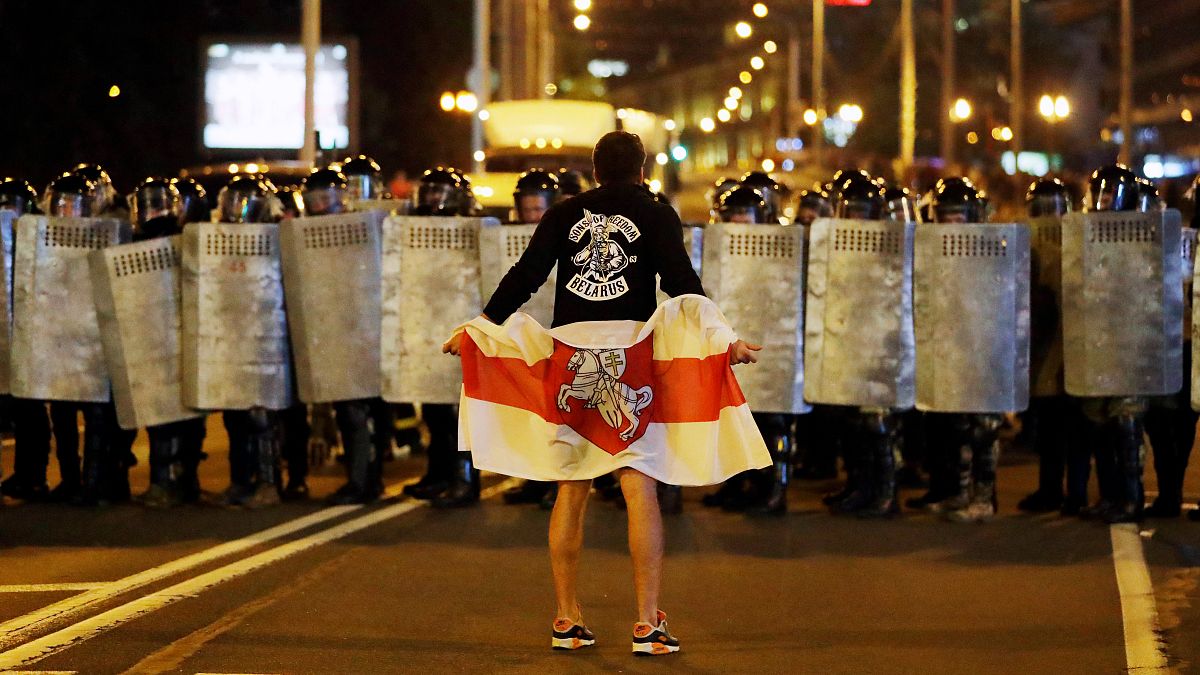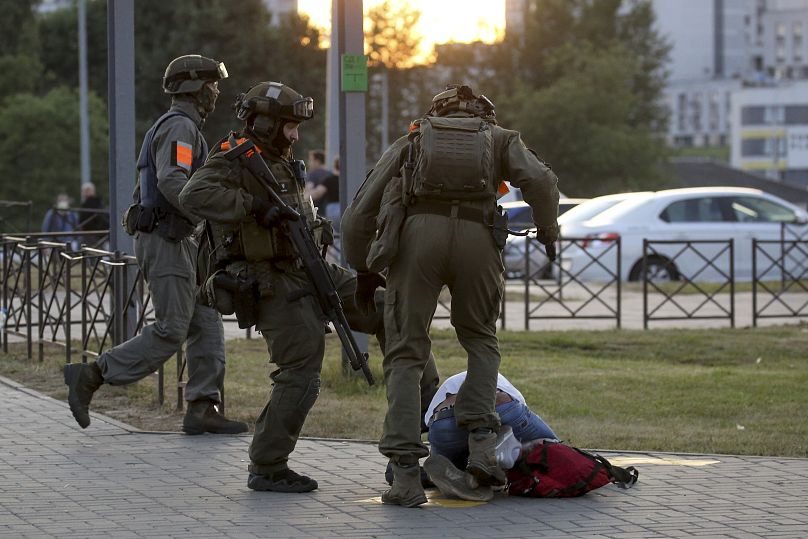Monday marks one year since the disputed election in Belarus, which sparked a protest movement of unprecedented size.
Monday marks one year since the disputed presidential election in Belarus, which sparked a protest movement of unprecedented size in a country that has been labelled “the last dictatorship in Europe”.
Alexander Lukashenko was declared the victor -- by a landslide -- in the August 9 vote.
In fact, he's been declared the winner of every presidential election held in the country since it split from the Soviet Union in the early 1990s.
Many believe he has held onto this position by rigging elections. This was the accusation of the opposition in Belarus, and tens of thousands of the general public, who took to the streets following the 2020 election result.
The year following the election has seen virtually the entire political opposition in Belarus locked up or forced to flee over the border. Sanctions have been levied on Lukashenko and his associates. And the trouble raging in the country has reverberated across Europe.
Here’s a look at the key events that have happened since the election.
9 August 2020: Election day
Like the presidential elections that had come before, Lukashenko claimed a landslide victory. But unlike previous elections, the opposition and swathes of the general public did not believe he had won a free and fair election.
Amid an internet shutdown, city streets were also closed by police and security forces, seemingly in an attempt to quell any protests.
This didn’t work, as thousands upon thousands took to the streets, demanding free and fair elections.
9-11 August: Mass protests and police repression
As protesters continued to gather in cities across the country, they were met with brute force by the police and security services.
The news reported by state agency Belta that Lukashenko had won more than 80 per cent of the vote, with the main opposition candidate Sviatlana Tsikhanouskaya taking less than 10 per cent, did nothing to quell the protests.
Two protesters were reported to have been killed in clashes with police, and thousands of people were arrested.
11 August 2020: Sviatlana Tsikhanouskaya flees
With her husband jailed prior to the election, former school teacher Sviatlana Tsikhanouskaya took up his mantle and stood as the primary opposition candidate during the election.
She is thought by many to have won the election, but the electoral commission in the country declared Lukashenko the winner by a landslide.
The day after the election result was announced, Tsikhanouskaya went to the electoral commission to demand an official recount.
The following day she released a video from Lithuania, where she had fled, declaring: “What is happening now is not worth any life.”
14 August 2020: First sanctions declared against Lukashenko
The European Union became the first entity to declare sanctions against the Belarusian authorities since the election.
These were soon followed by other western countries, such as the UK, Canada, and the US, as the state repression against peaceful protests continued to ramp up.
The sanctions were announced on the same day that Amnesty International said there was mounting evidence of the widespread use of torture against peaceful protesters.
16 December 2020: Tsikhanouskaya awarded human rights prize
The European Parliament awarded Sviatlana Tsikhanouskaya its Sakharov prize for human rights.
David Sassoli, the European Parliament president, said at the time: “The strength of your spirit has shown the way to revolution, which has taken power in the country in 2020 and we pay tribute to you and to your resistance and to your perseverance.”
Tsikhanouskaya was adamant the fight would go on. "We are bound to win, and we will win,” she told the parliament.
December 2020: Protesters change tack
Peaceful protesters took to the streets in their thousands every weekend for months after the August election, despite the violent repression they faced from security services.
But eventually, worn down by this and the mass arrests that took place at each protest, they started to change their tactics at the end of the year.
First, there were much smaller rallies, spread out across cities, which made it harder for the police to crack down and make arrests.
Then individual citizens started doing acts of individual defiance. Euronews spoke to one 47-year-old business owner who was attempting to stop paying some taxes, as “all the money they receive is used against us, the people.”
April 2021: Belarusian government defends actions
In an interview with Euronews in April, Belarus’s foreign minister defended the government’s handling of the election and protests, conceding that excessive force was used, but insisting it was necessary.
Vladimir Makei said there was “an attempt at a coup d'état...therefore, the actions of law enforcement agencies and authorities were absolutely adequate and necessary."
During the interview, he added that “our relations with the European Union, with The West in general, are in crisis,” while dismissing questions about the validity of the election result.
May 2021: The final independent media outlet is shut down
Belarusian police raided the offices of Belsat TV in the centre of Minsk on 21 May 2021 - shutting down the last independent media outlet that was still standing.
Along with repression against citizens protesting peacefully in the streets, journalists attempting to cover the story and make the outside world aware of what was happening were also being arrested and silenced.
More than 500 journalists have been arrested in the country since the election, and data from Reporters Without Borders showed it was the most dangerous country in Europe for journalists in 2020.
The crackdown is continuing against individual members of the media.
In July the homes of at least 21 reporters were raided, with arrests made.
23 May, 2021: Ryanair flight ‘hijacked’
A Ryanair flight from Athens to Vilnius was forced to land in Minsk after air traffic control told the pilot there was a credible bomb threat on board.
Upon landing a journalist critical of Lukashenko’s regime was taken off the plane and arrested.
Western countries called the incident an example of “state piracy”, saying in a statement: “We are united in our deep concern regarding the Lukashenko regime’s continuing attacks on human rights, fundamental freedoms, and international law.”
Roman Protasevich, the arrested journalist, was shown on state TV confessing to having been involved in a plot to seize power in Belarus - a confession his family and associates said was a result of torture.
July 2021: Lithuania declares state of emergency over illegal migration
In June more than 410 people illegally cross the border from Belarus into Lithuania - more than has been recorded in the previous four years combined.
This has led to accusations that Belarus is not only avoiding collaborating with Lithuania to deal with the issue, but is actually helping the migrants to cross the border.
Lithuania declared a state of emergency in July due to the numbers crossing, as border towns held protests over the issue.
The Lithuanian State Border Guard Service has called it “a pathetic revenge policy”, with Lithuania granting asylum to a number of political dissidents who fled Belarus following the election.
Meanwhile, the number of Belarusian asylum seekers in Europe rose sharply since the election.
Around 995 people sought shelter in EU countries between August and December 2020 compared with 545 over the same period in 2019.
3 August 2021: Belarusian activist found dead in Ukraine
The Belarusian House in Ukraine, an NGO that helps people who have fled repression in Belarus, accused Minsk of a "planned operation" after its director Vitali Shishov was found dead in Kyiv on Tuesday.
"There is no doubt that this is a planned operation of the security forces to liquidate a person truly dangerous for the Belarusian regime," the group said on Telegram.
Shishov, 26, was forced to flee to Ukraine last fall after taking part in anti-government protests in Gomel, southern Belarus, and "actively opposing" authorities, the Belarusian House said.
Ukrainian police opened a murder investigation after Shishov was found hanged in one of Kyiv's parks on Tuesday, not far from his place of residence.
3 August 2021: Sprinter escapes Belarus return at the Olympics
Krystsina Tsimanouskaya, a sprinter representing Belarus at the Olympic Games in Tokyo, obtained protection from Japanese authorities at Haneda Airport in Tokyo to avoid returning to Belarus.
She said she feared for her safety if she was sent home.
Tsimanouskaya had been due to compete in the women’s 200m sprint in Tokyo, but after she criticised the way her team was being managed on social media, officials came to her hotel room and told her to pack her bags.
The 24-year-old was granted a humanitarian visa to Poland, where she arrived safely that week.
“We are running free, and Belarus will be free,” she declared at a press conference in Warsaw.
International Olympic Committee (IOC) is investigating allegations that the Belarusian Olympic team’s had attempted to force her to return home.



